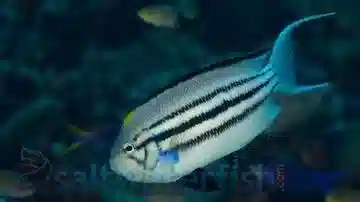Lamarck Angelfish
Genicanthus lamarck
(2 Reviews)

Lamarck Angelfish
Genicanthus lamarck
(2 Reviews)
{{ item.name }}
Size: {{ item.extra_field_3 }}
${{ getFormattedPrice(item.saleprice) }} ${{ getFormattedPrice(item.price) }}
To join the waiting list, click here
Free Shipping
With
$199.00
or more in Marine Life.
More details...
Lamarck Angelfish Care Facts
| Care Level: | Easy |
|---|---|
| Temperament: | Semi-aggressive |
| Reef Safe: | With Caution |
| Diet: | Carnivore |
| Origin: | Indo-Pacific |
| Acclimation Time: | 3+ hours |
| Minimum Tank Size: | 50 Gallons |
| Coral Safe: | Yes |
| Invertebrate Safe: | Yes |
Keeping the Lamarck Angelfish (Genicanthus lamarck) in Your Saltwater Aquarium
The Lamarck Angelfish, scientifically known as Genicanthus lamarck, is a captivating marine species frequently sought by dedicated saltwater aquarium enthusiasts. This comprehensive guide provides essential information for those contemplating the Lamarck Angelfish as a valuable addition to their aquarium. We'll delve into various aspects, including habitat, reef compatibility, size, lifespan, dietary requirements in captivity, aquaculture availability, compatibility with other marine species, sexual dimorphism, juvenile to adult coloration changes, temperament, detailed tank requirements, and precise water conditions. Additionally, we'll list common names for this species and highlight practical reasons for considering the Lamarck Angelfish from Saltwaterfish.com.
Habitat and Natural Range of the Lamarck Angelfish
The Lamarck Angelfish is indigenous to the warm waters of the Indo-Pacific region, where it thrives in the coral-rich zones and outer reef slopes. In its natural habitat, it finds refuge among the crevices and overhangs of coral formations. To ensure the well-being of your Lamarck Angelfish in captivity, it's crucial to replicate these conditions within the aquarium.
Reef Compatibility of the Lamarck Angelfish
The Lamarck Angelfish is considered reef-safe, making it a suitable choice for reef aquariums. This species primarily feeds on zooplankton and small invertebrates, showing minimal interest in coral polyps or other sessile invertebrates. However, occasional nipping at corals may occur, mainly if the fish's dietary needs are unmet. Therefore, a well-rounded diet is essential to deter unwanted coral grazing.
Size and Lifespan of the Lamarck Angelfish
The Lamarck Angelfish is classified as a medium-sized angelfish species, typically reaching 6 to 8 inches (15 to 20 centimeters) in captivity. When kept in a well-maintained aquarium and provided with proper care, this species can last 10 to 15 years or more.
Diet in Captivity of the Lamarck Angelfish
Feeding the Lamarck Angelfish in captivity is relatively straightforward. Their diet should consist of:
- High-Quality Marine Pellets: Incorporate high-quality marine pellets into their daily feeding routine to ensure they receive essential nutrients.
- Frozen and Fresh Foods: Supplement their diet with various frozen and fresh offerings, including brine shrimp, mysis shrimp, and enriched frozen preparations.
- Algae and Plant Matter: Lamarck Angelfish are herbivorous and benefit from including marine algae and plant matter in their diet. Seaweed sheets or clips are suitable options.
Aquaculture and Availability of the Lamarck Angelfish
The Lamarck Angelfish is not commonly available through aquaculture efforts, and most specimens in the aquarium trade are wild-caught. When sourcing these fish, choosing reputable suppliers like Saltwaterfish.com is essential to ensure the health and well-being of your new addition.
Compatibility with Other Fish and Invertebrates
The Lamarck Angelfish is generally peaceful and compatible with many tankmates. Here are five compatible species to consider:
- Anthias (Anthiinae): These colorful reef fish coexist harmoniously with Lamarck Angelfish, adding vibrancy to your tank.
- Tangs and Surgeonfish (Acanthuridae): Tangs with different body shapes and feeding habits can often share a tank with Lamarck Angelfish.
- Butterflyfish (Chaetodontidae): Many butterflyfish species are suitable tankmates, provided ample swimming space exists.
- Wrasse (Labridae): The diverse wrasse family includes numerous species that can cohabit peacefully with Lamarck Angelfish.
- Damsel Fish (Pomacentridae): Some damselfish species are compatible, though individual temperament may vary.
Sexual Dimorphism of the Lamarck Angelfish
The Lamarck Angelfish does not exhibit significant sexual dimorphism, making it challenging to distinguish between males and females visually.
Juvenile to Adult Coloration Changes
Juvenile Lamarck Angelfish features a striking and intricate color pattern characterized by dark blue-black bodies adorned with complex yellow lines and patterns. As they mature into adults, their coloration transforms. Adult Lamarck Angelfish have a more subdued appearance with a pale grey to beige body and delicate blue markings around their face and fins.
Tank Requirements for the Lamarck Angelfish
To provide an ideal environment for your Lamarck Angelfish, adhere to these tank requirements:
- Minimum Aquarium Size: A tank with a capacity of at least 50 gallons (180 liters) is recommended for a single Lamarck Angelfish. Larger tanks offer more space for swimming and territorial behaviors.
- Decor and Hiding Places: Incorporate live rock structures, caves, and crevices to mimic their natural habitat and provide hiding spots.
- Water Conditions: Maintain stable water conditions with the following parameters:
- pH: 8.1 to 8.4
- Salinity: 1.020 to 1.025
- Water Temperature: 74 to 82°F (23 to 28°C)
- Water Flow: Moderate to strong flow to mimic their natural reef habitat.
List of Common Names for the Lamarck Angelfish
The Lamarck Angelfish is known by several common names, including the Lamarck's Angelfish and the Freckletail Lyretail Angelfish.
Why People Should Buy the Lamarck Angelfish from Saltwaterfish.com
Selecting Saltwaterfish.com as your source for the Lamarck Angelfish offers several practical benefits:
- Quality Assurance: Saltwaterfish.com is dedicated to providing top-quality marine life. Each Lamarck Angelfish is meticulously selected and cared for to ensure its well-being.
- Expert Guidance: Saltwaterfish.com offers valuable resources and expert advice to help you create and maintain an ideal aquarium environment for your Lamarck Angelfish.
- Convenience: With an easy-to-navigate online platform, Saltwaterfish.com offers a secure and convenient way to purchase marine fish and essential aquarium supplies.
- Sustainability: Opting for Saltwaterfish.com supports responsible sourcing practices, contributing to marine conservation efforts and preserving marine ecosystems.
In conclusion, the Lamarck Angelfish (Genicanthus lamarck) is a remarkable addition to any saltwater aquarium. Although their care requires attention to detail, the rewards of having this stunning species in your tank are well worth the effort. Ensure the health and well-being of your Lamarck Angelfish by sourcing them from reputable suppliers like Saltwaterfish.com.
Active in eating great. Reasonable priced
Reviewed by: Devin Short on April 6, 2025
Nice fish
Reviewed by: Alvin Barbes on July 20, 2023








